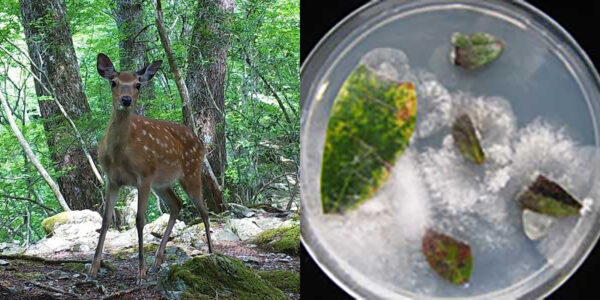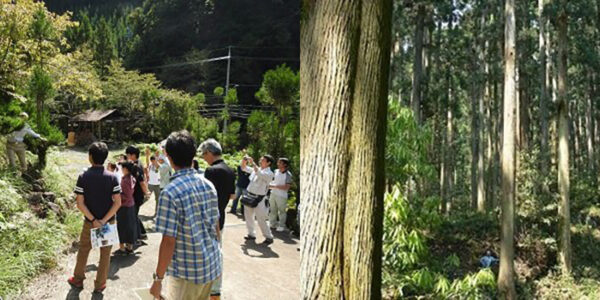There are seven local University Forests distributed from Hokkaido to Aichi prefecture. Each University Forest has its own unique research plan corresponding to its forest type. The University of Tokyo Hokkaido Forest located in sub-boreal zone studies to make sustainable use of natural forest resources compatible with environmental conservation. The University of Tokyo Chiba Forest and the Arboricultural Research Institute located in warm-temperate zone study on environmental conservation in artificial forests and secondary broad-leaved forests, management of wildlife, and physiological and ecological functions of woody plants. The University of Tokyo Chichibu Forest and the Forest Therapy Research Institute located in cool-temperate zone study on information technology for forest ecological studies and multiple use of forests such as recreation, eco-tourism, environmental education and so on. The Ecohydrology Research Institute and the University of Tokyo Tanashi Forest located near or in city study on public functions of forests such as hydrological cycle, climate control, purifying atmosphere and environmental education.
Please visit our website http://www.uf.a.u-tokyo.ac.jp/.
Laboratory of Forest Ecology and Functional Biology
Brief Lab Introduction
The Laboratory of Forest Ecology and Functional Biology conducts comprehensive and interdisciplinary research on the ecology and functions of forest organisms from both basic and applied perspectives. We employ a variety of approaches, ranging from micro to macro scales, and from laboratory work to field studies. Our aim is to establish management systems for healthy forest ecosystems by elucidating the ecology and functions of forest organisms. Additionally, we seek to contribute to human society, both directly and indirectly, through our research on the responses of organisms and ecosystems to environmental changes, the conservation of biodiversity, the management of pests and diseases, and the exploration and development of technologies for utilizing valuable biological resources.

Staffs
- Naoto Kamata (Professor)
- Shigehiro Kamoda (Associate Professor)
- Susumu Goto (Associate Professor)
- Dai Kusumoto (Lecturer)
- Dai Fukui (Lecturer)
- Toshihide Hirao (Lecturer)
- Hiroki Inoue (Assistant Professor)
- Daisuke Sakaue (Assistant Professor)
- Yoko Hisamoto (Assistant Professor)
- Tadashi Maehara (Assistant Professor)
- Ryou Nakahata (Assistant Professor)
Research Subjects
- Spatial and temporal population dynamics of forest defoliating insects and their biological interactions
- Influences of global warming on forest insects
- Wood boring insects and forest decline
- Genetic basis of local adaptations in forest trees
- Effects of climate change on forest tree species
- Ecological consequences of deer herbivory on biodiversity and biological interactions in forest ecosystems
- Ecosystem functioning of rhizosphere organisms and microbes in plant-soil feedback systems
- Molecular mechanisms of mass flowering in bamboo
- Expression analysis of flowering genes in Abies sachalinensis
- Long term dynamics and diversity of forests
- Stand development of forests that have been disturbed by a super typhoon
- Stand structure and dynamics of wave-regenerated forests
- Ecology and behavior of forest dwelling bats
- Defense responses and resistance mechanisms of trees against pathogens and their application to forest health.
- Diseases in forest nurseries and plantations, and their control
- Process of deserted mine reforestation and the role of symbiotic microorganisms, and improvements to reforestation
- Inhibiting factors of tree regeneration and improvement of regeneration
- Relationship between responses of trees against biotic/abiotic stress and gene expression/metabolites
- Mechanisms of useful metabolites formation of woody plants and their effective production
Laboratory of Forest Watershed Socio-Environmental Studies
Brief Lab Introduction
The Laboratory of Forest Watershed Socio-Environmental Studies conducts comprehensive and transdisciplinary research on the interactions between natural environments–such as forests and watersheds–and human societies. Our research focuses on the sustainable management of forest and water resources, examining the impacts of watershed environments on local communities and proposing solutions that integrate socio-economic perspectives. Through fieldwork, modeling, and technological innovation, we aim to provide scientific and socio-humanistic insights to foster harmonious coexistence between nature and humanity, with applications in ecosystem management, policymaking, and community initiatives.

Staffs
- Toshiaki Owari (Professor)
- Koichiro Kuraji (Professor)
- Hiroki Kobayashi (Professor)
- Naoki Yasumura (Associate Professor)
- Yuka Tokunaga (Specially Appointed Associate Professor)
- Nobuaki Tanaka (Lecturer)
- Yuko Asano (Lecturer)
- Haruo Saito (Lecturer)
- Deng Songqiu (Assistant Professor)
- Naoko Miura (Assistant Professor)
- Akio Fujiwara (Assistant Professor)
- Moein Farahnak (Assistant Professor)
- Masahiro Aiba (Specially Appointed Assistant Professor)
Research Subjects
- Watershed flood control and forest management systems
- Data-driven forest management using digital technologies such as ICT and AI
- Investigation and analysis toward self-sustaining of forest management
- Long-term changes in forest environments and their effects on water, sediment and wood transport
- Best practice for balancing timber production and water resources management in forest watersheds
- Activities and systems to develop links between people and forests
- Analysis of 3 dimensional information of forests and grasslands using UAV
- Development of smart precision forestry technology using laser sensing
- Changes in rainfall–runoff processes following thinning and clear-cutting in dense Japanese forest plantations
